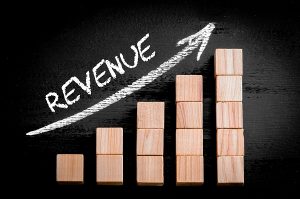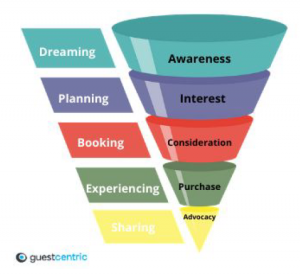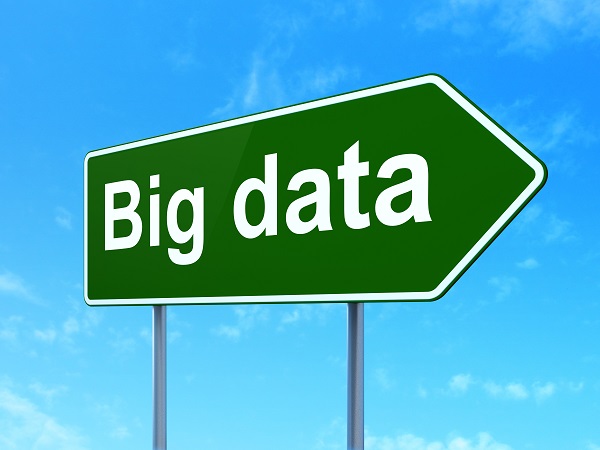
Digital marketing vs digital sales: Why your accom needs both
When it comes to digital marketing vs digital sales, the lines are undoubtedly blurred.
Many, including digital marketing managers, assume the two are one and the same and use the terms interchangeably.
However, the two are very different, require different approaches and must be deployed at the appropriate phase of the buyer’s journey.
In this article, we will explore the key differences between digital marketing and digital sales, as well as how both work hand in hand to increase your hotel’s visibility online and increase direct revenue.
Digital marketing vs digital sales – what’s the difference?
The difference between marketing and sales dates back to the 1950s. Thanks to technology, much has changed since then, but the fundamental principles remain the same.
Back in the days of Don Draper, marketing was all about generating desirability around a product or service, while sales focused on closing the deal.
Here is a breakdown of both terms:
Digital marketing
Digital marketing for hotels involves creating brand awareness and generating leads through website optimisation, metasearch and search engine optimisation (SEO) or social media. Digital marketing departments will typically use email, websites, social media channels and SEO to get their message across a large audience.
Digital marketing channels enable hotels to connect with potential guests from across the world at a click of a button. Your hotel’s digital marketing department will also have access to dashboards that measure ROI and other key KPI metrics. Lead generation can be achieved through innovative calls to action (CTAs), newsletter subscriptions, blog posts, discounts and offers, social media posts, and even influencers.
Digital sales

Digital sales, on the other hand, involves converting leads and prospects into customers. A hotel’s digital sales team will be responsible for convincing potential guests to purchase room stays, meals, and other offers. They will ensure the booking engine is optimised for guests to make direct reservations and take the guests through a list of the hotel’s best offers to ensure they close the sale.
For your hotel’s digital sales team to be successful in converting leads they have to start with having a quality database of potential customers. Database curation will involve narrowing down on potential leads that have the highest chances of becoming guests. You can create a database of leads through shopping activation and shopping recovery widgets, email marketing, and discounts and offers.
The digital marketing funnel – the process of converting a visitor into a customer

Imagine you have booked a room and one night before your stay realise that your flight will be delayed due to bad weather. You call the hotel to say your check-in will be delayed, but before you hang up, the front office manager asks if you would recommend the hotel to friends and family.
But how can you when you haven’t yet physically seen or experienced the room? A hundred things could go wrong (or right!) in your experience along the journey.
While this may be an extreme example, it goes to show how crucial it is to have a digital marketing funnel – a clear process of converting an online searcher or website visitor into a guest.
A digital marketing funnel is a way of breaking down the customer journey into the following set of stages: Dreaming, Planning, Booking, and Sharing. From there, you need to also segment your marketing activities into five categories to resonate with customers at every stage of their journey – from the moment they find your hotel online all the way to check out and beyond.
While there may be an existing demand for what you offer, you also need to generate demand, engage your audience and incentivise them to book with you.
For example, many prospective guests may still be in the ´Dreaming’ phase – undecided and probably with no intention of even booking a holiday. Trying to sell to that audience from the onset may not generate the desired results. You need to strategically appeal to the customer’s emotions and generate the demand with the beautiful rooms and offers you have available.
Where digital marketing & digital sales meet
Although there are key differences between digital marketing and digital sales, there are many areas where both techniques can be deployed to generate demand and drive sales. Below are just some areas where digital marketing and digital sales meet:
- Hotel website (it’s both about generating the demand and converting on it)
- Social media (can be brand awareness, engaging and delighting, or pushing offers)
- Paid social (optimal for sales pushes, but also good to raise awareness and target specific audiences)
- Email (can be used to create brand awareness, nurture leads and drive sales)
So how can hoteliers know when to deploy digital marketing or digital sales? The answer will mostly be determined depending on the audience you are trying to target and their stage in the buyer’s journey.
The risk of digital sales bias
While most digital marketing experts will agree that equal attention must be given to marketing and sales initiatives, it’s easy to fall into the trap of focusing predominantly on sales to the exclusion of marketing. This approach not only risks falling on a disengaged or desensitised audience but can also become a nuisance and damage your reputation as a hotel brand.
In fact, many businesses are guilty of obsession with selling products and services. This results in a waste of resources trying to sell to a disengaged audience.
However, it’s easy to understand why this is the case. As the digital landscape grows more sophisticated and data-driven by the day, it becomes increasingly accountable, measurable, and expensive. The result is that there are now more KPIs to demonstrate return on investment of resources toward campaigns and initiatives, resulting in a ‘show-me-the-money’ mindset.
Key decision-makers – quite rightly, with the best of intentions – now want to know what they were getting for their investments. So what was once quite a laid-back, community-driven marketing industry has now become more efficient and reliant on data to drive sales. But at what cost?
The bottom line is that by focusing too much on quick win sales, you lose sight of the bigger picture and miss out on nurturing your customer base. You need to build trust with your audience and a relationship, otherwise, you will not be able to effectively sell to them.
Digital marketing vs digital sales – why both are essential for hotel brands
Advertising legend David Ogilvy once said, “In the modern world of business, it is useless to be a creative, original thinker unless you can also sell what you create.”
When it comes to digital marketing for hotels, you need to ensure that it appeals to logical minds and sells to the decision-makers in your hotel as well as to your customers. One of the biggest challenges is demonstrating the value of digital marketing initiatives and campaigns beyond digital leads and sales.
Below are four ways to measure the value of your digital marketing initiatives:
- Brand reputation
This is a measure of attitudes, conversations, and behaviour toward your hotel brand. Thanks to technology, hotels have no shortage of tools at their disposal to monitor, solicit, analyse and measure their reputation according to guest feedback. This can be gathered via online reviews but also through guest satisfaction surveys, and guest messaging.
Demonstrating the value of brand reputation is easy when you consider that 93 percent of all customers consult online reviews before booking a room, according to Digital Commerce. The same research reveals that 88 percent of all users would avoid looking at hotels with a score of three stars or less.
- Customer experience
This involves improving your relationship with customers and their experience with your brand. Customer experience can be measured through guest feedback surveys. You should also look at customers who cancel the booking process midway to understand how to improve their experience.
Good customer experience means your customers will spend more. In fact, 86 percent of buyers are willing to pay more for great customer experience, according to a study by PWC.
- Innovation
As guest behaviours and demands continuously evolve, collaborating with customers to drive future offers, packages, and experiences give hotels a huge competitive advantage. What better way to ensure that you are giving guests exactly what they want than by inviting them to participate in the process of developing your future offers?
You could even get creative and request feedback via a fun and engaging format. For example, you could request feedback via an Instagram story poll, as shown in the image below.
Not only will you get valuable feedback to put into action straight away, but your followers will also feel involved and valued. Knowing that their feedback helped you make some hotel-related decisions, will give them extra incentive to visit your property and see their feedback in action.
- Advocacy
This involves measuring how many people have raised awareness about your hotel through user-generated content on social media or publications which have mentioned your hotel online.
Research by Global Web Index shows that user-generated content on social media significantly influences holiday-planning activities.
Consumers are actually more likely to discover travel destinations through the content their peers share on social media – whether that’s photos/videos (37 percent) or recommendations (32 percent) – than they are via branded travel ads (24 percent).
For this reason, it’s important to get your audience involved on social media, and you can do this by ensuring you provide share-worthy moments to your guests.
Balance is essential for marketing & sales ROI
Of course, this isn’t to say that the metrics above should take the place of analysing how your digital marketing initiatives maximise digital sales. However, there should always be a balance and room for creativity to test different ideas that appeal and eventually sell to your target customers.
It’s also worth mentioning that we as humans are emotional creatures. We like to think that we are rational human beings, but in reality, we are driven by emotions and use data to back up our views.
And that’s where digital marketing comes in – emotion. You need to create the desire for someone to one day act upon your hotel’s offering. In order to do this, you need to figure out what makes people tick, what excites them, what makes them smile when they think of your hotel, and what emotions you want them to feel.
In short, you should ask yourself: ‘How am I going to stir the emotions of my customers? And then, how am I going to sell to them after that?’
Pedro Colaco is CEO and president of GuestCentric Systems






